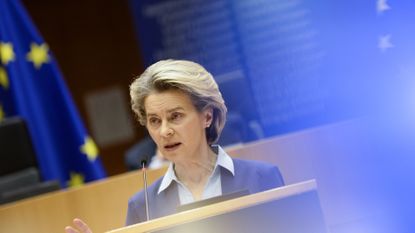EU facing pressure to follow UK’s lead on delaying second Covid vaccine
World Health Organization backs decision to leave eight to 12 weeks between doses

EU leaders are coming under increasing pressure to fall into line with Britain’s strategy of delaying the second Covid-19 vaccine dose after the World Health Organization (WHO) gave its backing to the plan.
The WHO yesterday signed off on giving the Oxford-AstraZeneca vaccine to older adults, while also encouraging countries to delay the second jab in order to inoculate more people in a shorter period of time.
Boris Johnson responded to the WHO’s announcement by saying that it was “good to see” the health body vindicate the decision to give patients their second shot between eight and 12 weeks after the first jab.
Subscribe to The Week
Escape your echo chamber. Get the facts behind the news, plus analysis from multiple perspectives.

Sign up for The Week's Free Newsletters
From our morning news briefing to a weekly Good News Newsletter, get the best of The Week delivered directly to your inbox.
From our morning news briefing to a weekly Good News Newsletter, get the best of The Week delivered directly to your inbox.
The WHO’s judgement “will be taken as a vindication of Britain’s controversial decision to disregard dosing strategies” in order to “quickly offer protection to millions more older people”, The Times says. “It also gives reassurance to those unnerved by criticism of the vaccine from EU leaders, who will now come under pressure to fall into line with the British approach.”
Several EU nations, including Germany and France, have not recommended the Oxford-AstraZeneca vaccine for the over-65s. French President Emmanuel Macron went so far as to wrongly state that the jab is only “quasi-ineffective” when used on people over 65.
The WHO committee said research “suggests it is likely that the vaccine will be found to be efficacious in older persons”, Politico reports, and therefore found that “taking the totality of available evidence into account” it recommends its use on older patients.
David Spiegelhalter, professor of biostatistics at the University of Cambridge, told The Times it would be interesting to see “how this goes down in Germany, France, Austria, Poland, Sweden, Denmark, the Netherlands and Spain, who are all currently denying their older citizens this protection”.
European Commission President Ursula von der Leyen yesterday said she “deeply regretted” the EU’s threat to restrict the flow of vaccines passing between the Republic of Ireland and Northern Ireland. Insisting that “in the end we got it right” she added that the EU “will do its utmost to protect the peace in Northern Ireland”.
Create an account with the same email registered to your subscription to unlock access.
Sign up for Today's Best Articles in your inbox
A free daily email with the biggest news stories of the day – and the best features from TheWeek.com
Chas Newkey-Burden has been part of The Week Digital team for more than a decade and a journalist for 25 years, starting out on the irreverent football weekly 90 Minutes, before moving to lifestyle magazines Loaded and Attitude. He was a columnist for The Big Issue and landed a world exclusive with David Beckham that became the weekly magazine’s bestselling issue. He now writes regularly for The Guardian, The Telegraph, The Independent, Metro, FourFourTwo and the i new site. He is also the author of a number of non-fiction books.
-
 'Republicans want to silence Israel's opponents'
'Republicans want to silence Israel's opponents'Instant Opinion Opinion, comment and editorials of the day
By Harold Maass, The Week US Published
-
 Poland, Germany nab alleged anti-Ukraine spies
Poland, Germany nab alleged anti-Ukraine spiesSpeed Read A man was arrested over a supposed Russian plot to kill Ukrainian President Zelenskyy
By Peter Weber, The Week US Published
-
 Today's political cartoons - April 19, 2024
Today's political cartoons - April 19, 2024Cartoons Friday's cartoons - priority delivery, USPS on fire, and more
By The Week US Published
-
 Dengue hits the Americas hard and early
Dengue hits the Americas hard and earlySpeed Read Puerto Rico has declared an epidemic as dengue cases surge
By Peter Weber, The Week US Published
-
 Covid four years on: have we got over the pandemic?
Covid four years on: have we got over the pandemic?Today's Big Question Brits suffering from both lockdown nostalgia and collective trauma that refuses to go away
By Chas Newkey-Burden, The Week UK Published
-
 How happy is Finland really?
How happy is Finland really?Today's Big Question Nordic nation tops global happiness survey for seventh year in a row with 'focus on contentment over joy'
By Harriet Marsden, The Week UK Published
-
 The hollow classroom
The hollow classroomOpinion Remote school let kids down. It will take much more than extra tutoring for kids to recover.
By Mark Gimein Published
-
 How Tehran became the world's nose job capital
How Tehran became the world's nose job capitalUnder the radar Iranian doctors raise alarm over low costs, weak regulation and online influence of 'Western beauty standards'
By Harriet Marsden, The Week UK Published
-
 Africa's renewed battle against female genital mutilation
Africa's renewed battle against female genital mutilationUnder the radar Campaigners call for ban in Sierra Leone after deaths of three girls as coast-to-coast convoy prepares to depart
By Harriet Marsden, The Week UK Published
-
 Excess screen time is making children only see what is in front of them
Excess screen time is making children only see what is in front of themUnder the radar The future is looking blurry. And very nearsighted.
By Devika Rao, The Week US Published
-
 Argentina: the therapy capital of the world
Argentina: the therapy capital of the worldUnder the radar Buenos Aires natives go hungry to pay for psychoanalysis, amid growing instability, anxiety – and societal acceptance
By Harriet Marsden, The Week UK Published